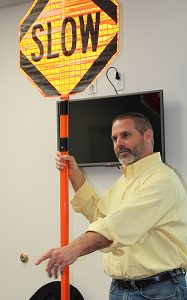InTrans / Oct 31, 2016
Improving the knowledge and skills of Iowa’s transportation workforce

It was a warm day for early March. Twenty-two county public works employees were in a meeting room at the Hamilton County Courthouse in Webster City, Iowa, attending a Flagger and Work Zone Safety training session.
The training is important, even for this group of mostly veteran workers, because many would soon be working on county roads, often with cars and trucks zipping by. The traffic control flagging principles and work zone safety training they received is designed to help keep them and drivers safe.
“The training is required for those who do the actual flagging and recommended for all other road workers,” said Paul Albritton, technical training coordinator with the Iowa Local Technical Assistance Program located at Iowa State University’s Institute for Transportation.
Flaggers learn, for example, what to wear, how to stop and release vehicles, and how to handle emergencies. However, all road maintenance workers benefit from the instruction.
“We also talk to the broader group of workers to encourage and emphasize safety,” added David Veneziano, Iowa LTAP Safety Circuit Rider, who conducted the training session with Albritton. “If the training prevents even one person from getting injured, it is worthwhile.”
The workshop is an example of Iowa LTAP’s mission of improving the quality and safety of the surface transportation system in Iowa, says Keith Knapp, Iowa LTAP director, who has been providing transportation-related training, outreach, and research for more than 25 years. “Our primary objective is to provide quality training events and technical transportation-related information that is useful to local transportation agencies in their daily operations.”
Iowa LTAP is managed through InTrans under an annual contract administered by the Iowa Department of Transportation. It began in 1983 as the Rural Technical Assistance Program, one of 10 original such programs funded by the Federal Highway Administration.
LTAP’s goal today is the same as 1983: bring many types of transportation technology to Iowa’s public works and county employees to improve their knowledge and skills. LTAP staff develop workshops on topics such as bridge inspection, sign and pavement markings, and motor grader operation. LTAP staff also assist other groups, such as Iowa’s county engineers, with professional development events.
LTAP offers two professional development programs, the Public Employees Leadership Institute (see adjacent story) and the Roads Scholar Program, which promotes continuing education among transportation workers. Road Scholars take courses and workshops to earn up to four levels of achievement, the highest of which is the Elite Roads Scholar. Each level is a significant accomplishment, Knapp says.
Iowa LTAP recently began a new Iowa traffic safety effort. The Statewide Multi-Disciplinary Safety Team (MDST) program is a coordinated effort between LTAP, the Iowa DOT, and the Iowa Governors Traffic Safety Bureau to facilitate communication and collaboration among Iowa’s regional MDSTs. The regional groups consist of local city and county officials, law enforcement, and others who help identify and address local transportation issues, including identifying and mitigating the causes of crashes.
“One of the program’s main goals is interagency collaboration and information exchange,” Knapp says. “This statewide approach will improve communication among MDSTs on important technical transportation issues.”
Technical information from LTAP is also available through various media. In addition to a quarterly newsletter, LTAP’s Stan Ring Memorial Library, named for a former Iowa LTAP director, has a growing collection of printed materials, DVDs, online content, and recorded webinars. Of course, information is also available by simply contacting one of the LTAP staff.
Knapp said he is proud of LTAP’s role in fostering a safe, efficient, and environmentally friendly transportation system in Iowa. He said through training, technical assistance, technology transfer, and by working together, “We strive to enhance the quality of life for all Iowans.”
Public Employees Leadership Institute helps current and future supervisors
The Iowa Local Technical Assistance Program works with its partner organizations to help some Iowa public works employees better prepare themselves for leadership positions. The Public Employees Leadership Institute provides a convenient way for new supervisors and those wanting to someday move into management positions to gain valuable skills and enhance their leadership qualifications.
The Leadership Institute offers 14 self-paced online courses on topics such as supervisory and leadership skills, legal issues, emergency management, finance, and project management. The content is targeted for city, county, or state agency workers, but most of the courses are applicable for employees in almost any business.
The program is a joint effort of Iowa LTAP, the Institute for Transportation at Iowa State University, and ISU Extension and Outreach, with support and assistance provided by the Iowa chapter of American Public Works Association and the Iowa County Engineers Association. The APWA has accredited the institute.
One participant said the Leadership Institute was “invaluable” as he furthered his career. “The web-based format was perfect for working courses into my hectic schedule.” He added that the course content “was well worth my time.”
From “InTrans En Route – July 2015 to June 2016” published by the Institute for Transportation.